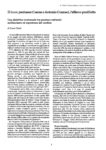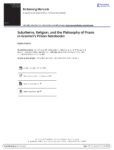International Gramsci Society Archive
The IGS Archive is a platform for members of the International Gramsci Society to share their research papers and publications, via free access, facilitating the exchange of ideas and information across the globe.
COERÇÃO E CONSENSO NA PERSPECTIVA DO ESTADO AMPLIADO.
A partir da perspectiva ampliada, o Estado não é autônomo na condução das políticas repressivas frente aos operários, manifestantes de movimentos sociais ou moradores das favelas. Entretanto, o estado-coercitivo não será imparcial aos desmandos autoritários e agressivos da sociedade civil. A hegemonia exercida caracteriza-se pela força e consenso, equilibrando-se, sem que uma prevaleça totalmente sobre a outra. A coerção não existe sem o consenso, nem o consenso prescinde da força. Ampliando-se o Estado, ele torna-se um conjunto de relações sociais estratificadas. Portanto, se os atos coercitivos (policialescos e jurídicos) ocorrem em democracias estáveis, períodos de transição democrática ou conjunturas autoritárias, eles não são cometidos devido a excessos ou ações de homens maus, mas sim características sócio-históricas de controle social, inexistindo uma separação entre Estado Restrito e Sociedade Civil. A Hegemonia é constituída de consenso e coerção. Para efetuarmos uma análise mais clarificada, torna-se imprescindível pensar os atos repressivos policiais e jurídicos numa perspectiva gramsciana. Trabalhando com a concepção de Estado Ampliado, o esquema simplificado, segundo o qual a Sociedade Política corresponde à coerção e a Sociedade Civil à Hegemonia consensual, é pulverizado. Através da complexidade da análise gramsciana inexiste a divisão entre as esferas. A análise dicotômica ignora a perspectiva das Díades Gramscianas, inserindo em lugar destas complexas determinações históricas, falsos antagonismos entre Sociedade Civil X Sociedade Política. A leitura cuidadosa dos Cadernos dos Cárceres proporciona uma crítica à interpretação consolidada da suposta oposição Coerção X Consenso. Mas, é absolutamente necessário o confronto com a observação histórica. A análise marxista ultrapassa a aparência, mas sem a concretude dos fatos, estaremos reduzidos a metafísica. A análise concreta marxista exige pesquisa de uma situação concreta.
Il buon professor Cosmo e Gramsci, l’allievo prediletto
A HISTÓRIA SOMOS NÓS: reflexões sobre histórias de vida, autobiografia, cultura popular, narradores e pesquisadores
Este trabalho debate algumas questões teóricas e metodológicas ligadas à pesquisa sobre cultura popular no Brasil. Em particular, são apresentadas as discussões desenvolvidas na Itália a partir das “Observações sobre o folclore” de Antonio Gramsci, para sublinhar-lhes a atualidade e a fecundidade no panorama contemporâneo da cultura subalterna no Nordeste do Brasil.
Gramsci, o “folclore” e o dia 22 de agosto: observações impertinentes
Les “Observations sur le Folklore” réunissent, comme chacun sait, quatre courts textes de Gramsci consacrés aux manifestations et, notamment, à la “conception du monde et de la vie” du “peuple”, à savoir, “des classes subalternes et instrumentales de toute forme de société constituée jusqu’à présent”. Dans mon rapport, je vais opposer les idées de Gramsci sur la culture populaire à l’idée du folklore présente dans l’école brésilienne qui s’est formée, en quelque mesure, à partir de l’oeuvre de Camara Cascudo.Mots-clés:Culture Populaire; L’identité Nationale; Camara Cascudo.
The Fallacy of Fake News: Exploring the Commonsensical Argument Appeals of Fake News Rhetoric through a Gramscian Lens
Thanks to Donald Trump, fake news has become a buzzword that allows for the dismissal of facts which are incon-venient to a person’s worldview. When used to characterize media sources, this rhetorical maneuver becomes an essentially irrefutable argumentative technique – a “trump” card that ends a discussion because the opposition’s premise is depicted as false. Since deploying the concept of fake news reinforces ideology and systems of power, this paper explores the phenomenon from the perspective of Gramscian hegemony. More specifically, Gramsci’s notion of common sense helps us understand the fallacious appeal of fake news. As a result, the paper discusses the implica-tions of fake news in the context of hegemony and provides suggestions for potential ways to articulate good sense as a means to challenge the common sense of fake news.
Revoluciones pasivas en América
Gramsci e la Rivoluzione d’Ottobre
La peculiare formazione di Gramsci gli fece scorgere nelle due rivoluzioni russe del 1917 l’inveramento delle sue concezioni soggettivistiche. La successiva comprensione della differenza tra “Oriente” e “Occidente”lo portò a una “rivoluzione del concetto di rivoluzione”, cioè a una profonda ridefinizione dei fini e delle modalità del cambiamento rivoluzionario, pur senza fargli rinnegare l’importanza storica dell’Ottobre né la solidarietà di fondo con il primo Stato socialista della storia.
Subalterns Religion and the Philosophy of Praxis in Gramsci s Prison Notebooks
The purpose of this essay is to reconstruct the relationship between subalterns, religion, and philosophy in Antonio Gramsci’s Prison Notebooks. With the birth of mass society—that is, with the entry onto the political scene of the popular masses, and above all of the peasantry—politics entered directly into relation with irrational passions bound up with the religious mentality, and hegemony was constructed not thanks to the institution of a “filter” for the passions (as was the parliament of “notables”) but through the mastering of those “passions” using forms of Caesarist and charismatic democracy. In Gramsci’s view, the political action of the subaltern classes had to confront this new form of hegemony by recognizing the value of the profound content of religious ideas (which always indicate the need for a unification of theory and practice) and by working on a “translation” of those ideas into the forms of self-organization and self-emancipation.
Qué es la crisis de hegemonía. Apuntes sobre historia, revolución y visibilidad en Gramsci
History appears already to the young Gramsci as a system of forces in unstable balance, which struggle to position themselves on the side of history, to identify with it. For this reason, in his reading of Marxism, the unity of history is a result, the product of a successful strategy of hegemony building. This article reviews the Gramscian theory of hegemony and tries to show its coherence with the philosophy of praxis, that is, with the notion of the fundamentally practical nature of reality. In particular, it is argued that, on the one hand, a crisis of hegemony must be understood as disintegrating (and not emptying) a hegemonic system, which allows subordinated hegemonic moments to emerge; on the other hand, the crisis itself is determined by the formulation of hegemonic discourses that try to escape their condition of subordination.










